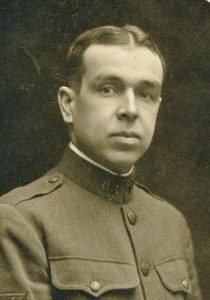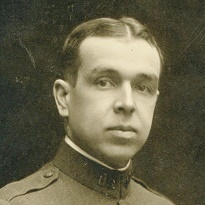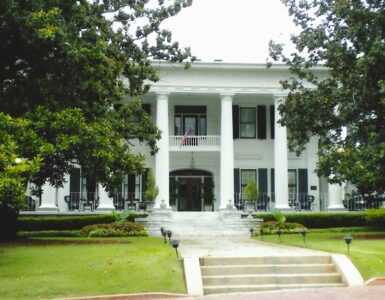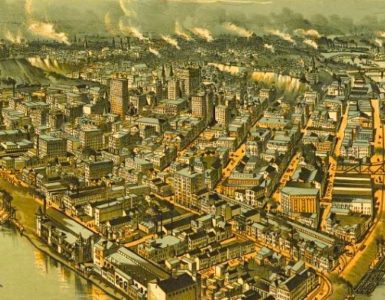 If you have not read the previous articles of this series you may want to do so by visiting the first part, “J. Gresham Machen, France 1918, and then continue through the series by using the link at the end of each article.
If you have not read the previous articles of this series you may want to do so by visiting the first part, “J. Gresham Machen, France 1918, and then continue through the series by using the link at the end of each article.
Having relocated to Paris following his escape from the advancing Germans at the front, J. Gresham Machen made brief trips from the city to speak to camps of troops in several locations. He hoped that since he was no longer attached to the French Foyers du Soldat program of the YMCA, his supervisors would finally give him an opportunity to work with American soldiers in a ministerial capacity. Indicative of his spiritual concern for the soldiers, on one occasion Machen planned for a chaplain to oversee an evening service with himself leading the morning worship but on Saturday night many of the troops moved to another encampment. On Sunday morning all he “was able to do was to read a chapter from the Bible and offer a prayer with six or eight men” (146). Machen went on to join the relocated doughboys in their new camp named Camp de la Grande Voivre near Brouville which is located about 220 miles due east of Paris. The work required of him was considerably more than he experienced with the French because the large facility served many soldiers. However, the work was still essentially operating a store and snack bar as he had done with the French YMCA. One of his duties that became a time consumer because it required considerable walking from place to place was providing money orders for the troops so they could send funds back home to their families.
 As Machen did his work he continued to be frustrated by the lack of interest shown by the soldiers regarding the Bible, Christ, and worship. The American Expeditionary Force (AEF) officers did not help the situation because they “nearly always had roll-call of the men just at the hour of my service” (150). Added to the lack of concern shown by officers regarding the spiritual welfare of their men was the general indifference of the soldiers themselves. On one occasion, Machen was attending a worship service led by an Episcopal chaplain which had to be moved to another location because of the noise of a ball game outside and the loud thuds coming from the wall as the ball bounced from its surface. Several years ago I asked a minister who was a chaplain during the D-Day invasion how receptive the soldiers were to the Gospel—he responded that the “harvest was ripe” (Matthew 9:36). Though it is the opinion of only one chaplain working with troops landing at Normandy it shows that there was at least some interest, but according to Machen’s experience, such was not the case in World War 1. From what he said in his letters regarding personal evangelistic experiences with the troops it is clear that he would have exegetically and doctrinally affirmed the harvest is always ripe according to God’s sovereign purpose, but as the Word is sown and reaped in the fields of the world the abundance of yield will vary. His observations regarding the indifferent and hostile attitudes shown by many was indicative that at that point in time, in that place, in that war, the harvest appeared to be few. Machen was repeatedly discouraged by the circumstances.
As Machen did his work he continued to be frustrated by the lack of interest shown by the soldiers regarding the Bible, Christ, and worship. The American Expeditionary Force (AEF) officers did not help the situation because they “nearly always had roll-call of the men just at the hour of my service” (150). Added to the lack of concern shown by officers regarding the spiritual welfare of their men was the general indifference of the soldiers themselves. On one occasion, Machen was attending a worship service led by an Episcopal chaplain which had to be moved to another location because of the noise of a ball game outside and the loud thuds coming from the wall as the ball bounced from its surface. Several years ago I asked a minister who was a chaplain during the D-Day invasion how receptive the soldiers were to the Gospel—he responded that the “harvest was ripe” (Matthew 9:36). Though it is the opinion of only one chaplain working with troops landing at Normandy it shows that there was at least some interest, but according to Machen’s experience, such was not the case in World War 1. From what he said in his letters regarding personal evangelistic experiences with the troops it is clear that he would have exegetically and doctrinally affirmed the harvest is always ripe according to God’s sovereign purpose, but as the Word is sown and reaped in the fields of the world the abundance of yield will vary. His observations regarding the indifferent and hostile attitudes shown by many was indicative that at that point in time, in that place, in that war, the harvest appeared to be few. Machen was repeatedly discouraged by the circumstances.
Last night I had a neighboring Protestant chaplain, formerly a student at Princeton Seminary, to address the little group of men that we succeeded in collecting. I am impressed, by the way, with the immense superiority of the opportunity offered by the chaplaincy to that offered by the YMCA. At the present post, particularly, the YMCA secretary is a grocery clerk and nothing else. All deeper elements of the work are crowded out in one way or another. At least they seem to be. I have not yet given up all hope. This afternoon, for example, I hope to get two or three men together for prayer and Bible reading. We may find a comparatively quiet place at the edge of camp. (154)
No, I will not misapply Matthew 18:20 at this point, but I will note that no group was too small for Machen to teach the Bible. The book from which this quote is taken, Letters From the Front, provides information regarding the experiences of a Baltimore born, well educated, Presbyterian minister who wanted to do his bit for his country as a noncombatant serving with the YMCA. Some of the book is admittedly a tedious trek which on a few occasions exposes aspects of Machen’s personality and social relations that could have used some refining, but one of the things that is certain regarding his recollections of the war––he understood that war is a cataclysmic symptom of the fundamental problem in the world, sin. For him, the eternal issue at hand was resolving the sin problem by means of the accomplished atoning work of Christ and ministering its application to soldiers by teaching the Bible. Machen’s persistent efforts to evangelize men facing death is indicative of his commitment to take the Gospel to the world, even if he had to tediously sell hot chocolate and crackers while fighting off rodents in the process. In this centennial year of the war’s end, resolution of the issue of sin through the redemption wrought by Christ remains essential for personal peace in the midst of danger and for progress in glorifying and enjoying God forever.
To continue on to part 5, click HERE
Barry Waugh
The letter shown is the first one Machen wrote using American YMCA letterhead. It is used courtesy of Sandy Finlayson, Director of Library Services, Westminster Theological Seminary, Philadelphia.
In the book Letters from the Front, the American camp which Machen was assigned to, Camp de la Grande Voivre, is not only written “Voivre” but also “Voévre” (see pages 169, 172, 174, 285, and 345, in some cases located in footnotes). To add to the confusion there is another spelling, not used by Machen, “Voëvre” (note the change of accent). Machen translated the name as “mud camp,” but it seems the word “Voivre” may be an archaic form of the French verb for to live, “vivre.” Thus, instead of “mud camp” the meaning would be “camp of good living,” maybe “camp of the good life.” Both names would fit the context because in 1918 France experienced more than the usual amount of rain resulting in much mud, and soldiers might sarcastically call the encampment “camp of the good life” with the meaning, life was anything but good. So, if there is anyone who has facility with both French and English that can help the author of this site with his nominally-semi-literate reading of French and resolve this perplexing but supremely trivial dilemma, please contact me via the “Contact the Author” window to the right of this post to send a clarifying email.





